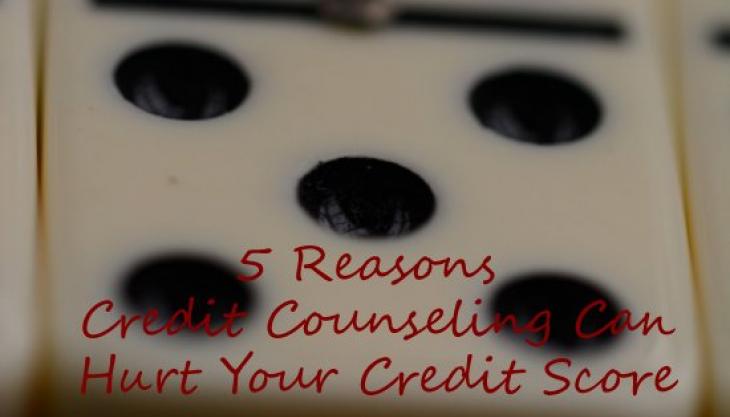5 Downsides to Consumer Credit Counseling
Submitted by Rachel R on Wed, 09/16/2015 - 12:26pm

Why credit counseling can hurt your credit score
Image Source: Flickr User Clint Budd
You may see many websites that encourage consumer credit counseling as the soundest choice and that state that bankruptcy should be your “last resort.” But, in some cases, bankruptcy can be a much better option to solve serious financial problems. Today we’ll take a look at five of the downsides to consumer credit counseling that you may want to consider before you decide on this course instead of bankruptcy.
#1 Credit counseling cannot help everyone
For those deep in debt and behind on their payments, it may be too late to try credit counseling. Because credit counseling involves the agency contacting your creditors and getting their buy-in, they may not agree to this option if you are already severely delinquent. Also, if the reason you aren’t paying your bills is because your income has dropped, you may not be able to afford this option. Credit counseling may better serve those who make enough to pay their bills but aren’t organized enough or don’t know how to create and stick to a budget.
#2 Credit counseling negatively affects your credit score
If you’re behind on your bills and making late payments, your credit score will drop continually as creditors continue to report your delinquency or short payments. When you enroll in a Debt Management Plan (DMP) established by a credit counseling agency, depending on the arrangement, your credit score may drop significantly while you’re in the plan. Some creditors will close your accounts or credit cards if you sign up for a DMP and closed accounts drop your score and lower your total available credit that also lowers your credit score. That can cause more problems.
#3 Credit counseling can take years to accomplish
A Debt Management Plan can take years to complete because you are typically required to make payment in full on the principal on the debts you owe. You may (or may not) be able to get a break on interest rates. Because you are paying your obligations in full, that means you will be paying on the DMP for years to come. The length of the plan will depend on what you owe and the arrangements that the credit counseling agency works out with your creditors. Comparatively, with Chapter 7 bankruptcy, you can be out of debt in just a few months.
#4 Credit counseling doesn’t usually reduce your debt
In addition to paying the principal in full – creditors usually won’t cut a break on this – you’ll still have to pay interest (but perhaps at a lower rate). None of your debt is wiped out – it all must be paid. The credit counseling agency charges a fee for setting up and administering the plan. Some charge you, some charge the creditors. Even “not for profit” agencies still charge a fee and still make money from the services they provide. The fees charged by the counseling agency are another reason you typically will not see reduced debt and won’t get a break on anything you owe.
#5 Credit counseling puts the focus on the creditor, not you
With Chapter 7 bankruptcy, the case and process focus on you and your ability to pay your debts. With a Debt Management Plan, your income is not a factor. The emphasis is on the creditor and what they want. Because the credit counseling agency has to get approval from your creditors for the DMP, they have to agree to the terms that the creditors offer. This means that you typically will not get a break on what you owe. Also, the creditors usually pay a “fair share” fee back to non-profit credit counseling agencies so the agency may be incentivized to prioritize the creditor.
Why bankruptcy is more effective in most cases
Simply put, your monthly obligations are generally not reduced with a DMP set up by a credit counseling agency. If you don’t make enough money to service your debts, credit counseling won’t solve that problem. One benefit that’s touted with credit counseling is that you do get a chance to educate yourself. But since the Bankruptcy Reform Act of 2005, all bankruptcy participants must now participate in credit counseling as a condition of discharge, so you will receive the benefit of counseling if choose bankruptcy. You also benefit from an immediate fresh start rather than years of punishing payments.
Contact the Law Offices of John T. Orcutt for a free North Carolina bankruptcy consultation – we have locations in Raleigh, Durham, Fayetteville, Wilson, Greensboro or Wilmington. Call +1-833-627-0115 today to get started on a debt-free and better tomorrow.
Debts Hurt! Got debt? Need help? Get started below!
Serving All of North Carolina
- Bankruptcy Attorneys Raleigh NC (North)
- Bankruptcy Attorney Fayetteville NC
- Bankruptcy Attorney Durham NC
- Bankruptcy Attorneys Wilson NC
- Bankruptcy Attorneys Greensboro NC
- Bankruptcy Attorneys Southport NC
- Bankruptcy Attorneys Wilmington NC
Bankruptcy Attorneys Raleigh NC (North)
6616 Six Forks Rd #203 Raleigh, NC 27615 North Carolina
Tel: (919) 847-9750

Bankruptcy Attorney Fayetteville NC
2711 Breezewood Ave Fayetteville, NC 28303 North Carolina
Tel: (910) 323-2972

Bankruptcy Attorney Durham NC
1738 Hillandale Rd Suite D Durham, NC 27705 North Carolina
Tel: (919) 286-1695


Bankruptcy Attorneys Greensboro NC
2100 W Cornwallis Dr. STE O Greensboro, NC 27408 North Carolina
Tel: (336) 542-5993

Bankruptcy Attorneys Southport NC
116 N Howe St. Suite A Southport, NC 28461 North Carolina
Tel: (910) 218-8682

Bankruptcy Attorneys Wilmington NC
116 N. Howe Street, Suite A Southport, NC 28461 North Carolina
Tel: (910) 447-2987
